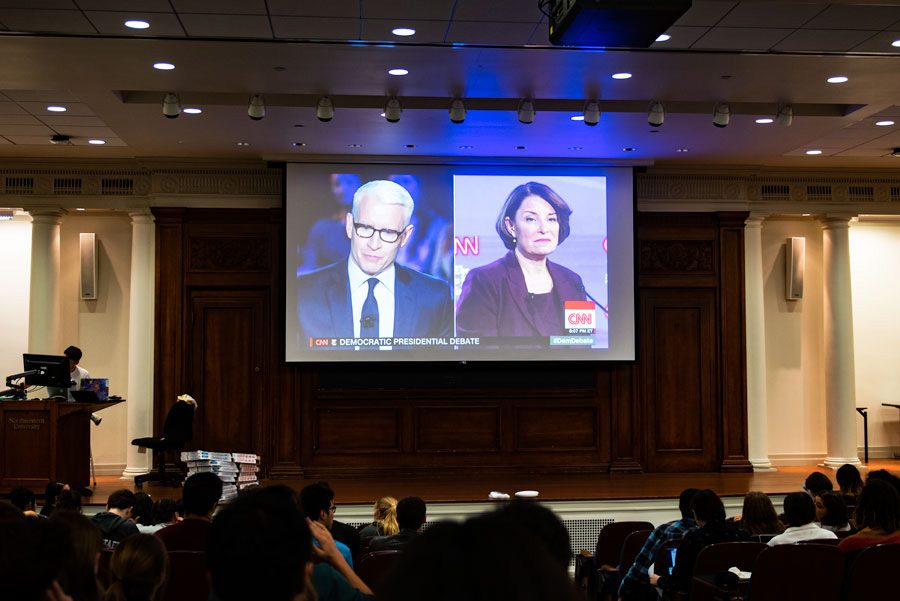Students weigh in on Democratic presidential primary race
Daily file photo by Zinya Salfiti
Students watch the Democratic Presidential Debate at Harris Hall. The presidential hopefuls debated topics such as the impeachment, the Middle East, health care, and gun control.
October 24, 2019
Four debates in and about 100 days away from the Iowa caucuses, voters across the country are beginning to declare their support for various presidential candidates. Among those voters are Northwestern student democrats, many of whom will cast presidential ballots for the first time come 2020.
With Sen. Elizabeth Warren (D-Mass.), former Vice President Joe Biden and Sen. Bernie Sanders (I-Vt.) leading the pack of 20 candidates in the tightening Democratic race, students have plenty of options.
In terms of who is fielding the most support, NU College Democrats press secretary Cameron Peters said the organization found the majority of students who attended their last roundtable, including himself, are leaning towards Warren.
While the Medill third year initially favored South Bend, Indiana Mayor Pete Buttigieg, because of his “bigger picture democracy reform plans,” Peters said his support for the candidate has decreased over the months. He attributed his shift to the mayor’s abandonment of “unabashed progressive” rhetoric and ideas.
As the race progresses, Peters noted his support for Warren over Buttigieg will most likely hold. However, he said he would like to see the senator begin aggressively making the case for her policy plans — such as Medicare for All — as opposed to defending them.
“I’m not sure the debates move the needle too much for me,” Peters said. “I think they’re a good showcase of why I might like or dislike any given candidate, but I don’t think I’ve come out of any of the debates yet thinking ‘wow, I hadn’t realized they were in this race, I hadn’t realized they felt that way, I want them to be president and I didn’t when I sat down to watch this debate.’”
Medill sophomore Imani Sumbi has been following the debates as well, noting she finds comfort in the fact that Warren began receiving attacks from the candidates in the fourth round. She said it resembles the “front-runner” treatment Biden is used to getting, bringing Sumbi confidence that Warren is a leading contender in the race.
Echoing Peters, Sumbi is supporting Warren despite originally being drawn to back another prominent candidate, Sen. Kamala Harris (D-Calif.).
“I really wanted to want Harris — as a black woman, I wanted to want a black woman to be in office,” Imani said. “But as it turned out, she’s just not the ideal candidate because of her criminal justice record in California. I like Warren’s progressive policies… and I think her strength is in her consistency.”
Unlike Peters and Sumbi, Weinberg junior Molly Jo Molloy has found the candidates’ performances so inconsistent that she hasn’t fully settled on a favorite yet.
Although she has found both Warren and Buttigieg’s command of the stage to be eloquent and informative, Molloy couldn’t say the same for the other presidential hopefuls.
“I’d say Beto (O’Rourke) kind of pisses me off with the really vapid inclusions of the same seven Spanish words that he knows,” Molloy said. “Obviously watching Biden most of the time is painful, to see him try and navigate the situation he’s gotten himself into.”
Molloy is currently waiting to see how the contenders handle the pressure to fundraise and earn support from various demographics.
Apart from the candidates, Molloy criticized the structure and execution of the debates themselves. She said the time spent rehashing certain issues over others is concerning, especially because topics like immigration continue to be omitted.
Sumbi also discussed her concerns with the content of the debates, noting she believes the topic of conversation should begin shifting away from electability and health care. She added the focus should be on issues such as voter suppression and the potential impact of gerrymandering on the census.
“We can’t wish things into existence if we don’t even have the ability to vote for the representatives we want,” Sumbi said. “So I definitely think that’s something that they should bring attention to, because that’s also a way of critiquing the Trump administration indirectly in a way that’s graceful and that’s relevant to everyone.”
Twitter: @daisy_conant
Email: [email protected]


